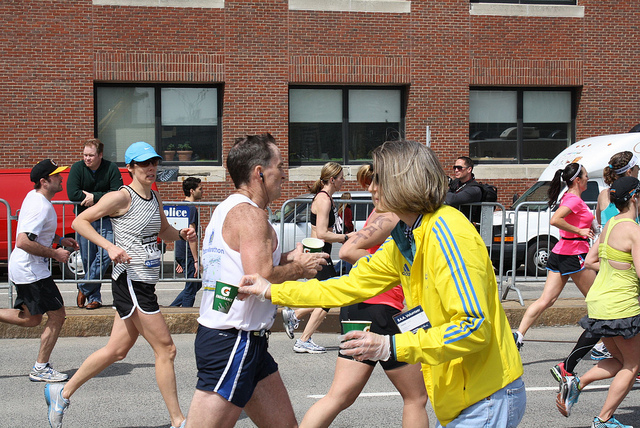
Have you ever participated, as a coach or client, in a coaching session when both the coach and client got on a wave length together that resulted in incredible insights and progress? After which, the client probably felt the coach did something amazing, while the coach may have felt s/he barely did anything, at all. If so, you may have experienced a "group flow" state.
Individuals go into flow states when they use their strengths in challenging situations, but groups of two or more people can also create group flow under specific circumstances. During flow, people are unusually creative, often feel that guidance is coming from without, and they may lose track of time. To learn more about flow, watch this TED video of positive psychology pioneer, Mihaly Csikszentmihalyi (rhymes with 'chick sent me high'), who coined the term, Flow.
Creativity researcher, R. Keith Sawyer, wrote a fascinating article on group flow for the Greater Good Science Center, based on his study of jazz ensembles and comedians. I've adapted his ideas here to describe the conditions that can foster group flow during a coaching session.
Conditions that promote flow during coaching:
1. A shared goal. In great coaching, both client and coach have a shared intention of moving the client towards achieving an important goal. To do this, the coach needs to let go of any personal goals s/he has to provide value, look smart, or get the client to do what s/he thinks is best. The coach also needs to create a safe, trusted environment for the client.
2. Engaged listening. Both coach and client need to listen deeply to themselves and to each other, putting aside preconceived notions about how the goal should be reached and checking in with each other frequently to make sure they are still on the same page. The coach takes the initiative here, modeling listening with intent, which can trigger the client to do the same. The coach also triggers deep engagement by asking awareness-building questions.
3. Forward motion. Acknowledgment, curiosity, and positivity all keep the session moving forward even when neither the coach nor the client knows exactly where they're headed. This means moving from "Yeah, but" thinking to "Yes, and" thinking, while remaining genuinely curious and avoiding judgments and closed-ended questions that can stop forward movement.
4. Undivided attention. Both coach and client need to be in private, non-distracting environments so they can attend fully to the shared present-moment conversation. Email, smart phones, other people and more can all derail a great coaching session.
5. Freedom and autonomy. Coach and client are equal partners who believe in each other, because the client needs the freedom to be exactly who he is while coaching. Flow emerges when they trust and respect one another enough for the client to find the answers that truly work best for him.
6. Supportive egos. Sometimes it seems as though the coach and client think together with one mind for a few minutes. To do so, they both need their egos present, but not running the show. Trying to get rid of the ego leads to dysfunction, but too much ego just gets in the way. To move egos aside, trust must be strong enough for coach and client to experience moments of intimacy.
7. Equal partnership. Coaching is different from most professions in that it is an equal partnership between the professional and client. The coach doesn't fix or advise and the client doesn't need to be healed by the coach. This equality fosters full participation by the client, which leads to resourcefulness, resilience and greatness.
8. Unspoken understandings. Coach and client need to reveal just enough information about themselves that they feel sufficiently known by one another. This implicit knowing allows communication to jump ahead quickly, rather than consume time with polite posturings. Hours, weeks, or even months of processing can take place within minutes.
9. Spontaneous conversation. The coach needs to let go of the coaching models and structures s/he learned in coaching school and just coach from the hip, so to speak. While the client needs also to let go and allow flow to occur. That's one of the many reasons why practice and mastery are essential for the coach and why an excellent fit between coach and client makes such a big difference.
10. Risk. Both coach and client need to be willing to fail in order for flow to show up. If they play it safe, many of the above conditions will evaporate. The coach must be willing to explore the unknown even if it means asking cringe-worthy questions, while the client needs to be courageous enough to answer honestly. There is no other way to find the best outcomes.
The above conditions don't happen automatically. The coach needs to know how to create trust and safety, while navigating the energy of the coaching conversation, in order to create this transpersonal experience. But when done well, coaching is often awe-inspiring.
Want to learn more about coaching and flow? Join the Certified Positive Psychology Coach Program or download the CPPC Fact Sheet below.

Photo by VANKUSO








